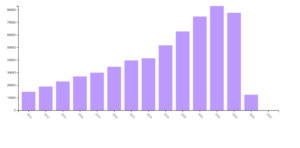American University Library’s Evidence Synthesis Consulting Service
By Katie Hut & Clarissa Ihssen
Fall 2024
The Expanding Role of Evidence Synthesis in Research
Systematic reviews, scoping reviews, meta-analyses—all these methodologies of research, and more, fall under the umbrella term Evidence Synthesis. The goal of this type of research is often to provide a comprehensive and unbiased overview of the existing evidence on a particular topic, which can then inform decision making.
First emerging in the health sciences a few decades ago, evidence synthesis research is known for espousing rigorous, systematic, and transparent approaches to identifying, selecting, and evaluating the information to be included in the review. This methodology has been increasing in popularity, as seen in the below graphic of systematic review and meta-analyses articles indexed in Web of Science.

More recently, evidence synthesis has gained ground in other disciplines outside health sciences, including the social sciences. As an example, according to Riegelman and Kocher, the databases Education Source and Sociological Abstracts have both seen jumps in published systematic reviews and meta-analyses since 2011. Further confirmation of the influence of evidence synthesis on the social sciences is the existence of the Campbell Collaboration, which was established in 2000 with the goal of producing reviews on the effectiveness of social interventions, and publishes reviews in diverse areas such as Aging, Business & Management, Child & Young Persons Wellbeing, Climate Solutions, Crime & Justice, Disability, Education, International Development, Knowledge Translation & Implementation, Methods, and Social Welfare (Ramirez et al., 2022). Today, evidence synthesis research can be found in nearly all academic disciplines (Gore & Jones, 2015).
American University Library’s Evidence Synthesis Consulting Service
American University researchers have already been conducting evidence synthesis for many years and we expect this to increase. To meet this demand, the University Library began providing consultations to researchers exploring evidence synthesis methodologies in Fall 2023 and officially launched our evidence synthesis consultation service in May 2024. Some of the projects we consulted on during the academic year 2023-2024 included a study on the prevalence of post-traumatic stress syndrome in counter-terrorist workers as well as looking at Black students in collegiate STEM (Science, Technology, Engineering, and Mathematics) programs in the DMV.
Through our service we help researchers with various aspects of conducting this research, including getting started, understanding the various steps and processes involved, determining if there are extant reviews on the topic, and exploring the various frameworks to help develop and refine the topic. It is common for faculty to see us for several consultations over the course of their research project. We enjoy getting to watch your research progress through all the stages of the evidence synthesis process.
Review Type
We can help determine which review type is the best fit for the research, timing, and scope of the project. While systematic reviews—identifying and synthesizing all empirical evidence that meets pre-specified criteria—are probably the most well-known of the evidence synthesis methodologies, they are also among the most time-consuming, have the most stringent protocols, and might not always make sense depending on the project. We recommend this flow chart from Cornell, “Which Type of Review is Right for You?” for figuring out which review type would be the best match (Rethlefsen et al., 2021).
Guidelines & Protocols
In addition, we can assist with wading through the various guidelines and protocols, which can be a little complicated. There are two types of guidelines: conducting guidelines and reporting guidelines. You can think of conducting guidelines as a playbook for doing evidence synthesis research. Meanwhile, reporting guidelines provide parameters for what researchers need to report and document. Along similar lines, some evidence synthesis methodologies require registering a protocol, which is a well-developed research plan that you communicate to other researchers very early on in the process to ensure transparency.
Conducting Searches
Our service can also provide guidance for the search and retrieval part of the process, including identifying relevant databases, mastering their corresponding search strategies, and identifying sources of grey literature.
We encourage researchers undertaking a systematic research methodology to check in with our service regardless of whether you have specific questions. Studies have shown that when librarians consult on evidence synthesis projects, the quality and reproducibility of the results are higher than those reviews that do not engage library support (Koffel, 2015; Rethlesen et al., 2015). For example, Koffel (2015) found “an association between stated librarian involvement and search quality in published reviews” and that “librarian involvement predicted higher-quality and more reproducible searches” (p. 9). In addition, Rethlesen et al. (2015) discovered that librarian involvement in systematic reviews correlated with the reproducibility of searches (p. 622).
If you are interested in working with our evidence synthesis service, please look at our research guide. On the page, “How AU Library Can Help” you will find an explanation of the kind of support we offer as well as an appointment form, where you can tell us a bit more about your project and request a meeting.
We look forward to working with you!
References
Gore, G. C., & Jones, J. (2015). Systematic Reviews and Librarians: A Primer for Managers. Partnership: The Canadian Journal of Library and Information Practice and Research, 10(1), Article 1. https://doi.org/10.21083/partnership.v10i1.3343
Koffel, J. B. (2015). Use of Recommended Search Strategies in Systematic Reviews and the Impact of Librarian Involvement: A Cross-Sectional Survey of Recent Authors: PLoS ONE. PLoS ONE, 10(5), 1–13. https://doi.org/10.1371/journal.pone.0125931
Ramirez, D, Foster, M, Kogut, A, & Xiao, D. (2022). Adherence to systematic review standards: Impact of librarian involvement in Campbell Collaboration’s education reviews | Elsevier Enhanced Reader. The Journal of Academic Librarianship, 48. https://doi.org/10.1016/j.acalib.2022.102567
Rethlefsen, M. L., Farrell, A. M., Osterhaus Trzasko, L. C., & Brigham, T. J. (2015). Librarian co-authors correlated with higher quality reported search strategies in general internal medicine systematic reviews. Journal of Clinical Epidemiology, 68(6), 617–626. https://doi.org/10.1016/j.jclinepi.2014.11.025
Rethlefsen, M. L., Kirtley, S., Waffenschmidt, S., Ayala, A. P., Moher, D., Page, M. J., Koffel, J. B., Blunt, H., Brigham, T., Chang, S., Clark, J., Conway, A., Couban, R., de Kock, S., Farrah, K., Fehrmann, P., Foster, M., Fowler, S. A., Glanville, J., … PRISMA-S Group. (2021). PRISMA-S: An extension to the PRISMA Statement for Reporting Literature Searches in Systematic Reviews. Systematic Reviews, 10(1), 39. https://doi.org/10.1186/s13643-020-01542-z
Riegelman, A., & Kocher, M. (n.d.). A Model for Developing and Implementing a Systematic Review Service for Disciplines outside of the Health Sciences. 58(1).
Author Profiles
Katie Hut is the Business & Economics Librarian at American University. Clarissa Ihssen is the Science Librarian at American University. We are both graduates of the March 2023 Evidence Synthesis Institute, which is fully funded by the Institute of Museum of Library Services (IMLS)



